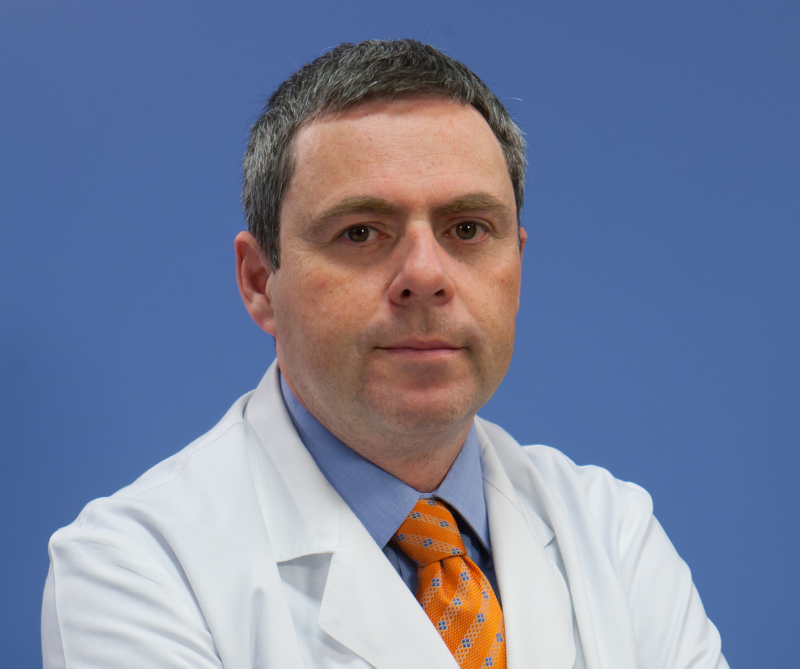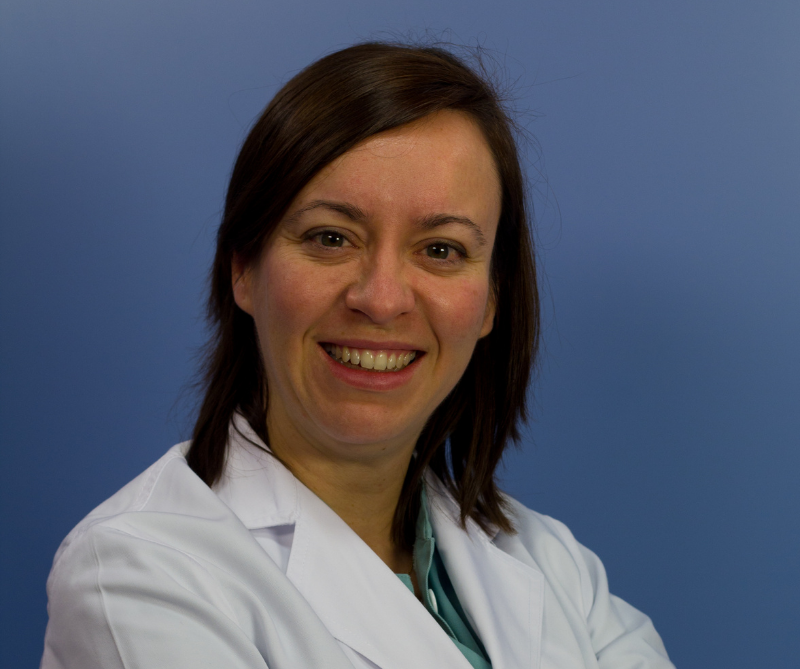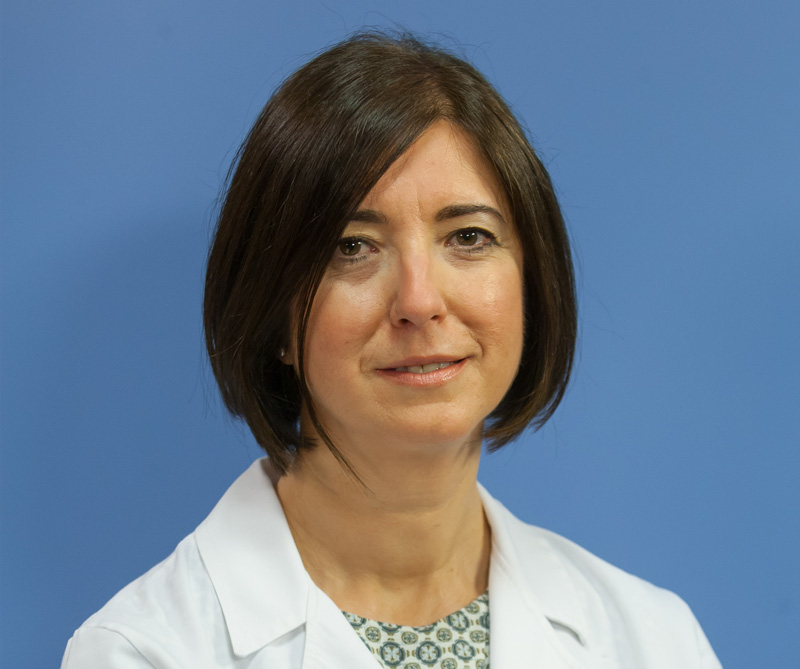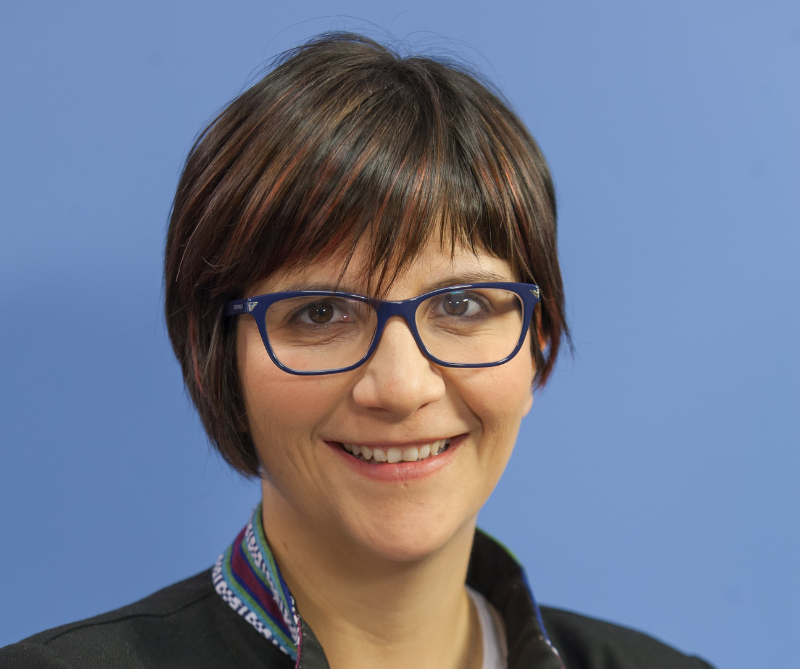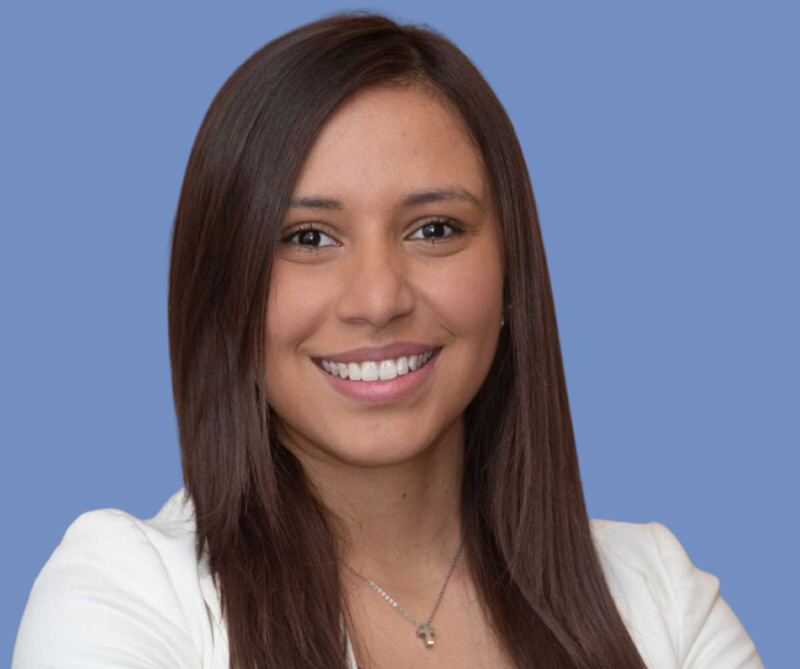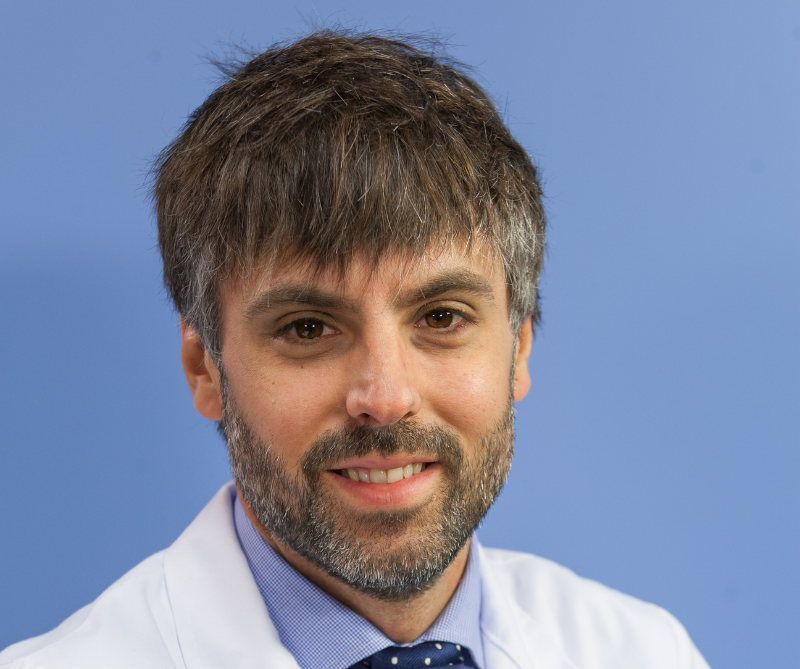Experience-based learning
Today, with the help of development technology, real-life situations can be recreated in virtually all areas of healthcare with the goal to learn and continue to acquire skills without putting the patient at risk, with the fundamental addition of incorporating error as part of the self-directed learning.
In addition, at the #MedUNAV Simulation Center we work for students to acquire other professional competencies such as communication skills, teamwork work , analysis and decision making, leadership skills, conflict resolution or stress management. All this, without forgetting the physician's raison d'être.
MISSION
It seeks to provide Degree and postgraduate program students with a state-of-the-art standardized training internship in a controlled and safe environment and to enhance medical skills.
VISION
We aim to achieve a campus with an educational model based on teaching and research, in which innovative solutions to today's problems and challenges are promoted.
VALUES
Our activities aspire to make present values that guide and characterise the daily work of those who form the University and configure its environment and its culture: the excellent work , freedom, respect, multidisciplinarity, responsibility, service, international outreach...
SIMULATORS
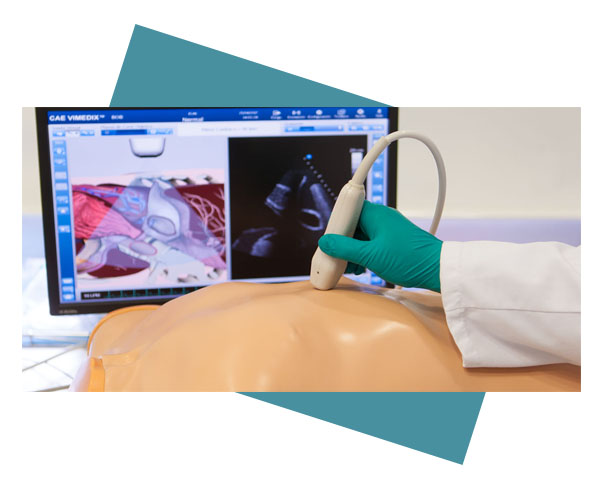
Vimedix
Ultrasound simulator that performs TTE, TEE (transthoracic and transesophageal echocardiography), and abdominopelvic scans in a single platform.
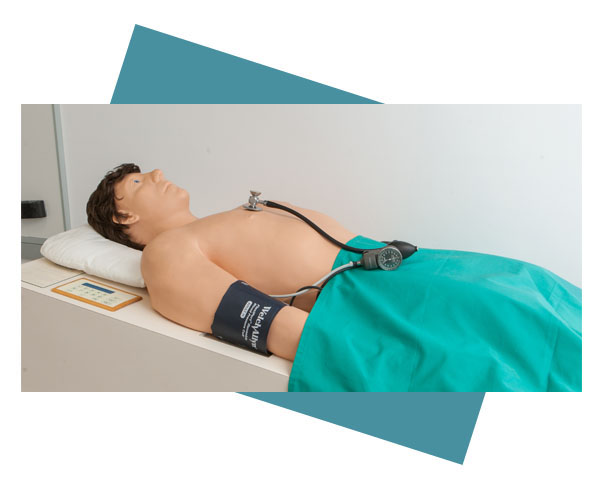
Harvey
Cardiology patient simulator. Includes 30 different pathologies such as valvulopathies, cardiomyopathies, congenital heart diseases, etc.
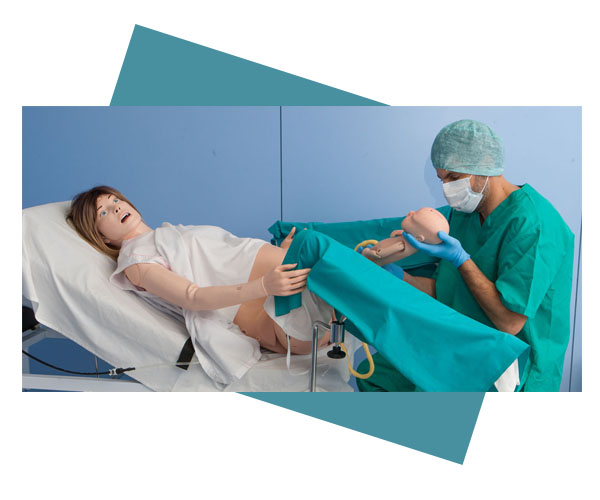
SimMom
SimMom is an advanced birthing simulator that offers manual and automatic deliveries for better obstetric knowledge teaching .
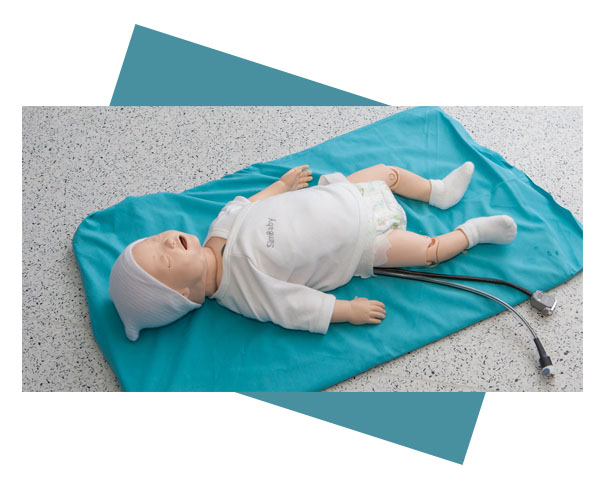
SimBaby
Highly advanced and portable universal infant patient simulator, for training on internship clinical cases through team-based work and learning how to manage resources and people in crisis situations.
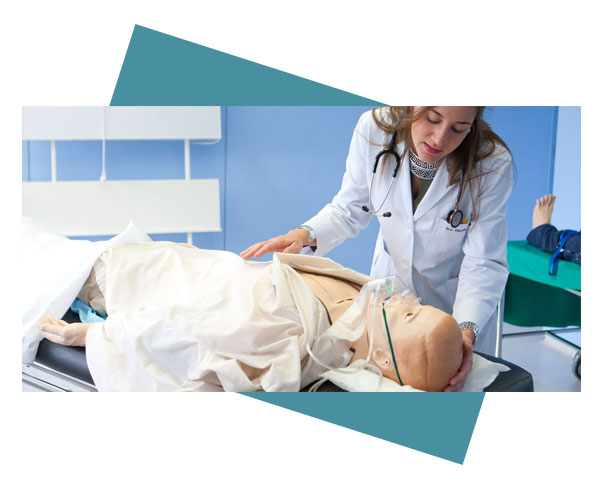
SimMan 3G
SimMan 3G can simulate a critically ill patient's responses to different severity conditions, combining physiological models, drug responses and the ability to show different clinical reactions.
MAIN FACILITIES
Intended for clinical skills workshops and debriefing sessions (viewing recorded scenarios and analysing performances with the trainer). They have capacity for 25 people and are equipped with a recording camera and two screens. These rooms can be joined together, doubling their capacity.
With a capacity for ten students, this is where the Harvey cardiac patient simulator is located, model , a life-size simulator that reproduces different cardiac pathologies.
We perform clinical scenarios with standardised patients as a learning method. They offer the student the possibility to learn communication skills, take a medical history or perform a physical examination.
Convertible into emergency rooms. They are equipped with an audiovisual recording system interconnected with the rest of the multi-purpose rooms. Each operating room has simulators (SimMan 3G, SimMOM, SimBABY, ALS Simulator) and advanced life support equipment for the recreation of clinical scenarios. They also have the Resusci Anne Skills Station simulator, designed for basic cardiopulmonary resuscitation, connected to a computer programme that corrects the practices of student in emergency rooms. All are equipped with equipment and instrumentation to simulate different clinical scenarios.
Each operating room has a Control conference room , from where the staff of the C.S. monitors the simulations and manages the computer and robotic resources.
The Centre has all the necessary material for recording the simulated clinical scenarios, including an audiovisual integration system, loudspeakers, microphones, video cameras and monitors, which enable fully participatory workshops that provide genuine feedback between teacher and students, or between the students themselves. In addition, a variety of material is available for the workshops and clinical scenarios at internship . Specifically, several human simulators, clinical simulation software and more specific skills simulators.
conference room equipped with audiovisual media for the post-scenario meeting . It analyses whether or not the objectives of the scenario have been met and conclusions are drawn.
The student has different simulators with the necessary means to acquire the required knowledge without the need of a teacher.
STAFF
Who we are
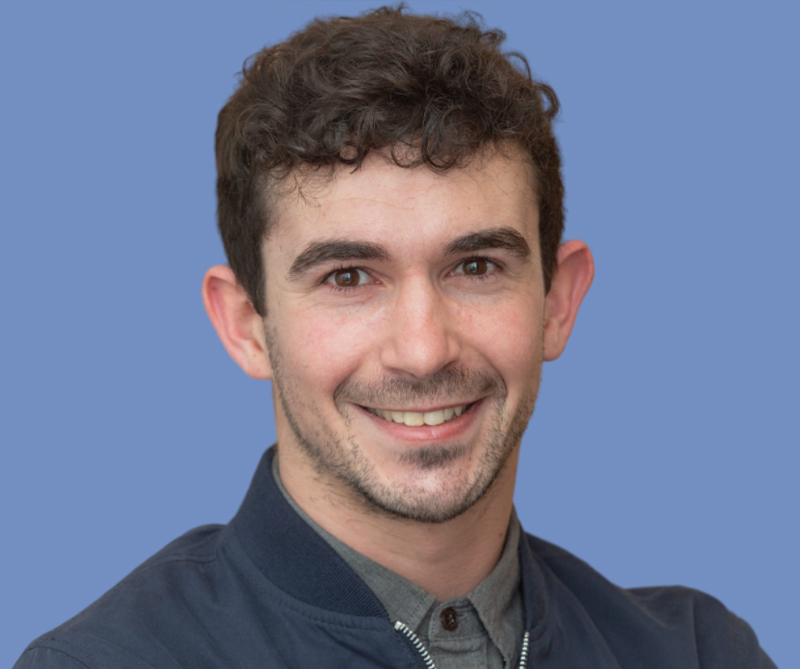
Iker Marquez
Simulation Technician

Degree
The School of Medicine is committed to teaching students the acquisition of professional skills that will make them better doctors. Communication skills, work teamwork, analysis and decision making and the application of theoretical knowledge in critical or common situations of the internship care, are some of the skills that we teach here.

postgraduate program
The School makes available the facilities of the Simulation Center for various courses of update aimed at residents and specialists. Advanced life support, emergency situations through clinical scenarios and other specific courses that they themselves request.
INTENDED FOR SPECIALISTS
The Simulation Center works in partnership with the commission of training and Human Resources are in charge of proposing training activities. If you are a specialist in CUN and you want to propose an activity, please go to form.
FOR RESIDENTS
The Simulation Center works in partnership with the commission of teaching that is in charge of proposing activities that they consider essential for them. If you are a resident and want to train in simulation, please contact us at contact (csm@unav.es).

Teaching tools
Competency Examination goal and Structured (ECOE)
The ECOE is an objective and structured competency test . It consists of a pathway for different positions where the student has to face different clinical situations common in the daily work of the physician.
They will have to demonstrate their ability to take patient history and explore patients, assess laboratory and complementary examinations, make diagnostic judgements, access medical information, demonstrate skills in practical procedures and their ability to deal with life-threatening patient situations.
Contact
Dr. Elena Cacho
ecacho@unav.es
Standardised Patient Programme
The Standardized Patient Program offers students the opportunity to train clinical, communication and work team competencies with people trained to play the role of patient, family member or companion.
Each year, more than 70 people between the ages of 18 and 76 participate in our program. University employees and students from different departments have collaborated in the program: Degrees, with the exception of Medicine, and Master's Degree, as well as students from the Senior Program.
Contact
Simulation Equipment
csm@unav.es

Online training
SIMUL-EYE
Eye simulator created by the Simulation Centre and the laboratory Medical Engineering.
ARRHYTHMIA
Online learning application and internship in the recognition of severe arrhythmias.
TFG, BOOKS AND PUBLICATIONS
Research
-
Martín-Calvo N, Gómez B, Díez N, Llorente M, Fernández S, Ferreiro Abal A, Javier Pueyo F. Development and validation of a low-cost laparoscopic simulation box. Cir Esp (Engl Ed). 2023;101:482-9
-
Llorente-Ortega M, Polo R, Chiva S, Martín-Calvo N, Sáenz-Santa-María E, Diez-Caballero F, Fernandez S. The development and validation of a new simulator for endourology. conference proceedings Urol Esp (Engl Ed). 2023;47:236-43.
-
Díez N, Pacheco S, Llorente M, Fernández S. Validation of a Sensor-Fitted Simulator for Upper Airway Examination. Otolaryngol Head Neck Surg. 2021 Feb;164(2):339-345. doi: 10.1177/0194599820941017
-
Besné GM, Alegre M, Podhorski A, Díez N. Validity evidence of SIMUL-Eye: eye movement and pupillary reflex simulator. certificate Ophthalmol. 2020 May;98(3):e397-e399. doi: 10.1111/aos.14209.
-
Rodríguez-Díez MC, Tejedor J, Alegre M, Campo A, Pons-Villanueva J, Díez-Goñi N. Clinical simulation scenarios designed by medical students: The description of a two-year experience. Aten Primaria. 2016 Aug-Sep;48(7):501-2.
-
Díez-Goñi N, Guillén S, Rodríguez-Díez MC, Pineda L, Alcázar JL. Use of the Learning Curve-Cumulative Summation Test for Leopold Maneuvers Assessment in a Simulator: A Pilot Study. Simul Healthc. 2015 Oct;10(5):277-82.
-
Rodríguez-Díez MC, Mañeru-Zunzarren G, Artáiz-Urdaci M, Ferrer-Puga M, Baraibar-Argota I, Lage-Fernández FJ, Díez N. Student satisfaction with a cardiology examination session given by trained peers. Fundación Education médica. 2015;18(1):35-38.
-
Rodríguez-Díez MC, Díez N, Merino I, Velis JM, A Tienza, Robles-García JE. Simulators help improve student confidence to acquire skills in urology. conference proceedings Urol Esp. 2014 Jul-Aug;38(6):367-72.
-
Rodríguez-Díez MC, Díez-Goñi N, Beunza-Nuin JJ, Aubá-Guedea M, Olartecoechea-Linaje B, Ruiz-Zambrana A, Alcázar-Zambrano JL - "Confidence of medical students in learning obstetric examination with simulators. An Sist Sanit Navarra 2013;36 (2): 275-80.
-
Díez N, Rodríguez-Díez MC, Nagore D, Fernández S, Ferrer M, Beunza JJ - "A randomized trial of cardiopulonary resuscitation training for medical students: voice advisory mannequin compared to guidance provided by an trainer" - Simul Healthc 2013;8(4); 234-41
-
Maneru G. The acquisition of skills and competencies in the Medical Simulation Center. From theory to internship. International Journal of Humanities, Issue 1, issue 2, 2012.
-
Maneru G. The error as a problem or as teaching strategy. Procedia-Social and Behavioral Sciences Journal Vol.46, 2012.
-
Rodríguez-Díez M.C, Beunza J.J, López-Del Burgo C, Hyder O, Civeira-Murillo M.P, Díez N. Learning the medical history with simulated patients at Degree de Medicina. Educ Med 2012; 15 (1): 47-52.
-
Maneru G., Rodríguez A. -"Creating Scenarios and Guiding Learning in a Medical Simulation Center". Creative Education Magazine, 2011.
-
Marcos Llorente Ortega. Sensorisation of the turbinates of the AirSim Bronchi airway simulator.
-
Guillermo M. Besné villanueva. "Validation of simul-eye: simulator of eye movements and pupillary reflexes".
Completed
-
development and validation of a neonatal jejunal atresia simualdor. student Researcher: Oscar Emilio Bueso. Director: Dr. Nerea Martín-Calvo. Course: 2023-2024.
-
development and validation of an esophageal atresia simulator. Student: Blanca Pérez. Director: Dr. Nerea Martín-Calvo. Course: 2023-2024.
-
Comparison of real patients and standardized patients at Degree medicine. A randomized controlled intervention study. Student: Beatriz Fránchez. Director: Dr. Nerea Martín-Calvo. Course: 2021-2022.
-
development and validation of a new simulator for Endourology. Student: Rocío Polo Gay. Director Dr. Fernando Diez-Caballero. partner laboratory of Medical Engineering, School of Medicine of the University of Navarra. Course: 2020-2021.
-
Validation of simulation models for teaching in laparoscopy. Student: Beatriz Gómez Amoedo. Director Dr. Francisco Javier Pueyo. Course: 2020-2021.
-
Carlota Voltas Moreno. Validation of abdominal examination simulator (Abdominal Examination Trainer; Limbs&Things). Director: Dr. Cristina Rodríguez-Díez. Course 2018-2019.
-
Sofía Pacheco López. "Validation of the airway simulation model : sensorized simulator for videoendoscopic exploration of the nasal cavities and upper airway (ENSF)". Director: Dr. Nieves Díez. Course 2017-2018.
-
Paula Montes Rodríguez Learning technical skills in the initial assessment of trauma patients through simulation. The role of played in-situ feedback for undergraduates. February 2016.
-
Javier Tejedor Tejada: "Preparation of a clinical scenario with SimMan 3G by students of subject of Advanced Simulation Techniques". February 2015.
-
Sergio Guillén Martínez: "Evolution of learning Leopold manoeuvres using cumulative curves in pregnancy simulators and real patients". February 2014.
-
Imanol Martínez Salas: "Simulated clinical scenarios in the Respiratory System subject ". February 2014.
-
Javier Tejedor Tejada: "Preparation of a clinical scenario with SimMan 3G by students of subject of Advanced Simulation Techniques". Director; Dr. Nieves Díez. Course 2014-2015.
-
Sergio Guillén Martínez: "Evolution of learning Leopold maneuvers by cumulative curves in pregnancy simulators and real patients". Course 2013-2014.
-
Imanol Martínez Salas: "Simulated clinical scenarios in the Respiratory System subject ". Director: Cristina Rodríguez-Díez. Course 2013-2014.
Ongoing
-
Sofía Pacheco López. Validation of model airway simulation: sensorised simulator for videoendoscopic exploration of the nasal cavities and upper airway (ENSF).
-
Sandra Rubio Bernabé. Validation of two new simulation models for lumbar spinal puncture and thoracic epidural puncture.
research thesis innovation in education The book "Fundamentos Pedagógicos de la Simulación Educativa en el area Sanitaria. Fundamentos Pedagógicos de la Simulación Educativa en el Sanitaria. Teaching Competences" has been published by publishing house Eunate.
It aims to provide an innovative approach to help the professor to better appreciate and understand their role, and aims to be a tool that promotes the speech and reflexion of teachers who are involved, or will be involved, in this exciting world of practical learning with simulators, both in the field of training in medicine and in nursing.
-
"Educational Simulation in Medicine. Study of teaching skills": Defended on 23 June 2014 by Gregorio Mañeru Zunzarren at the School of Education and Psychology of the University of Navarra.
-
International Pediatric Simulation Society (IPSSW 2023). Development of a neonatal jejunoileal atresia simulator for the training of pediatric surgeons. Nicolás López de Aguileta Castaño, Javier Arredondo Montero, María Rico Jiménez, Nerea Martín-Calvo. Lisbon. May 17-19, 2023.
-
Society for Simulation in Europe (SESAM 2022). Learning experiences with real patients and standardized patients in the 2nd cycle of the degree of medicine. Nerea Martín-Calvo, Nieves Díez, Marta Vidaurreta, Cristina Rodríguez, Francisco Javier Pueyo, Maite Betés, Secundino Fernández, Patricia Palacio. Seville. June 5-17, 2022.
-
Society for Simulation in Healthcare (IMSH 2021). Moving the OSCE online - our experience at the University of Navarra. Cristina Honorato, Nerea Martín-Calvo, Francisco Javier Pueyo. Comparison of results and student impressions with conventional OSCEs. Virtual. 19 January-31 March 2021.
-
IX congress of the Spanish Society of Clinical Simulation and Patient Safety (SESSEP). development and validation of a laparoscopic simulation box. Nerea Martín-Calvo, Beatriz Gómez, Nieves Díez, Marcos Llorente, Secundino Fernández, Francisco Javier Pueyo. Granada. November 25-27, 2021.
Workshops
-
"Practical workshop. Oxygen therapy and airway management". Dr. Francisco Javier Pueyo Villoslada. V congress National SESSEP. Murcia, March 2017.
-
"Pedagogy and Andragogy of Educational Simulation". Gregorio Mañeru Zunzarren. congress SESSEP National Conference. Barcelona, November 2014.
-
"evaluation initial trauma". Juan Pons de Villanueva, Manolo Alegre, Nieves Díez, Cristina Rodríguez-Díez. congress SESSEP National Conference. Barcelona, November 2014.
-
"Use of Clinical scenarios in the Degree of medicine". Workshop of the II Scientific conference of the Spanish Society of Clinical Simulation and Patient Safety. Granada, November 2013.
Communications
-
"SIMUL-EYE: Simulator of eye movements and pupillary reflexes". Guillermo Miguel Besné Villanueva. V congress National SESSEP. Murcia, March 2017.
-
"New technologies in university medical training : Childbirth Simulation". Macarena López Vázquez. V National congress of the SESSEP. Murcia, March 2017.
-
"Perfect tandem: Doctors and engineers". Marcos Llorente Ortega. V congress National SESSEP. Murcia, March 2017.
-
"Medical Simulator: It is really useful in urology?". Narro I. Merino, F.J. Ancizu, M. Hevia, J.M. Vellis, A. Tienza, R. Algarra, F. Díez-Caballero, D. Rosell, J.I. Pascual, C. Rodríguez-Díez, N. Díez, J.J. Zudaire, J.E. Robles. 30 th Annual Congress of the European Association of Urology. Madrid, March 2015.
-
"Preparation of a clinical scenario with SimMan 3G by students of subject of Advanced Simulation Techniques". Nieves Díez, Javier Tejedor, María Cristina Rodríguez-Díez, Manolo Alegre, Juan Pons, Arantza Campo. Barcelona, November 2014.
-
Incorporation of workshops in medical simulation center for the teaching of the palliative medicine subject in the degree of medicine. M.Martínez, J.Urdiroz, A.Larumbe, J.Vaquero, G.Mañeru, C.Centeno. 8th World Research Congress of the European Association for Palliative Care. Lleida, June 2014.
-
"Mini-Cex simulated in the Degree of Medicine". Rodríguez- Díez MC, Díez N, Arbea L, Alegre M, Sánchez de Miguel P, Ferrer M. XXI congress de la Sociedad Española de Education Médica. Madrid, October 2013.
-
"Learning of Leopold's manoeuvres using cumulative curves in pregnancy simulators and real patients". Díez N, Guillén S, Alcázar JL, Pineda L, Rodríguez-Díez MC, Ferrer M. XXI congress de la Sociedad Española de Education Médica. Madrid, October 2013.
-
"Preparation of a clinical scenario with SimMan 3G by students of subject in advanced simulation techniques". Díez N, Tejedor J, Rodríguez-Díez MC, Alegre M, Pons J, Campo A.. III congress of the Spanish Society of Simulation and Patient Safety. Barcelona, November 2014.
-
"Iniciación a la Clínica: Un project professor innovador". María Cristina Rodríguez Díez; Juan José Beunza Nuin, María José Sánchez de Miguel; Marta Ferrer Puga; Nieves Díez Goñi. XX congress of the Spanish Society of Medical Education . Valladolid, 5-7 October 2011. Education Médica 2011;14(2):B1-03.
-
"Teaching clinical history to first year students through patient simulation acted by senior undergraduate students". María Cristina Rodríguez Díez, Juan José Beunza Nuin, Marta Ferrer Puga, Nieves Díez Goñi.17th Annual Meeting of the Society in Europe for Simulation Applied Medicine. SESAM 2011. Simulation: a limits training methodology. June 2-4, 2011. Granada, Spain.
-
"A ramdomized controlled trial of undergraduate cardiopulmonary resuscitation training with a voice advisory manikin compared to traditional training with an trainer". Nieves Díez, Maria Cristina Rodríguez-Díez, David Nagore, Secundino Fernández, Marta Ferrer, Juan José Beunza.17th Annual Meeting of the Society in Europe for Simulation Applied Medicine. SESAM 2011. Simulation: a limits training methodology. June 2-4, 2011. Granada, Spain.
-
"Learning by simulation - an educational experience in the simulation center of the school of medicine of the University of Navarra". Maneru G, Rodríguez-Sedano A, Altarejos M. "World Conference on Educational Technology Researches -Cyprus 2011.
-
Comparison of real patients with standardized patients in the teaching of Degree in Medicine. Coordinator: Dr. Nerea Martín-Calvo. Collaborators: Dr. Cristina Rodríguez Díez, Dr. Nieves Díez, Dr. Marta Vidaurreta, Dr. Javier Pueyo, Dr. Secundino Fernández, Dr. María Teresa Betés, Dr. Patricia Palacio.
-
"Do you remember how?" Coordinator: Dr. Nieves Díez. 2014-15
-
"Techniques in Advanced Simulation". 2013-2014. Coordinator: Dr. Nieves Díez. 2014-15
-
"Techniques in basic simulation". Coordinator: Dr. Cristina Rodríguez-Díez. Course 2012-2013
area of Simulated Hospitalization
A space where students will face different clinical situations, with all their complexity, and will have to solve them in a comprehensive manner.
If you are interested in participating in the standardized patient program, please access the form.
If you are a teacher, want to join project and acquire your teaching hours, please contact contact with nurunuela@unav.es.
CONTACT
C/ Irunlarrea, s/n. 31008 Pamplona, Spain
Tel. (+34) 948 425 600 Ext. 806282
csm@unav.es



